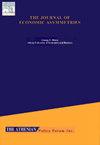On the use of Malmquist productivity indices for intertemporal performance assessment by means of composite indicators
Q1 Economics, Econometrics and Finance
引用次数: 0
Abstract
The family of Malmquist non-parametric productivity indices using either a single constant input or a single constant output is a consistent approach for measuring performance change in terms of composite indicators. In this setting, testing for Hicks-neutral technical change is important, since in its presence the choice among these Malmquist indices is unnecessary, whereas its absence points towards the asymmetric effects of overarching events and policies across the evaluated units. In this paper, we provide an empirical test for Hicks-neutral technical change by relying on recent developments on inference in dynamic nonparametric models of production. We then use it to examine the pattern of technical change in two study cases related to the UNDP Human Development Index and a social inclusion composite indicator. In both cases, country performance change over time is entirely attributed to technical change, which however is economically significant only in the latter case.
马尔姆奎斯特生产率指数在综合指标跨期绩效评价中的应用
Malmquist非参数生产率指数家族使用单一恒定输入或单一恒定输出,是衡量综合指标方面绩效变化的一致方法。在这种情况下,对希克斯中性技术变革进行测试是很重要的,因为有了希克斯中性技术变革,在这些马姆奎斯特指数中进行选择是不必要的,而没有希克斯中性技术变革则表明,总体事件和政策在被评估单位中的影响是不对称的。在本文中,我们提供了一个经验检验希克斯中性技术变革依靠最新发展的推论在动态非参数模型的生产。然后,我们用它来检验与联合国开发计划署人类发展指数和社会包容综合指标相关的两个研究案例中的技术变革模式。在这两种情况下,国家业绩随时间的变化完全归因于技术变革,但只有在后一种情况下技术变革才具有经济意义。
本文章由计算机程序翻译,如有差异,请以英文原文为准。
求助全文
约1分钟内获得全文
求助全文
来源期刊

Journal of Economic Asymmetries
Economics, Econometrics and Finance-Economics, Econometrics and Finance (all)
CiteScore
4.80
自引率
0.00%
发文量
42
审稿时长
50 days
 求助内容:
求助内容: 应助结果提醒方式:
应助结果提醒方式:


